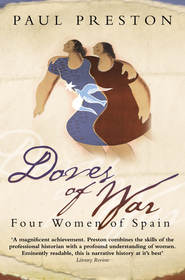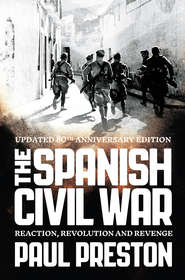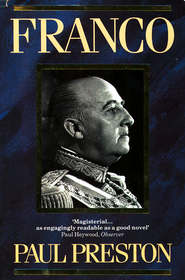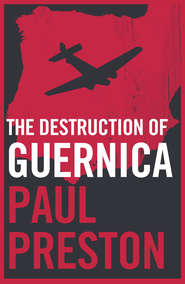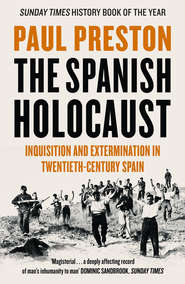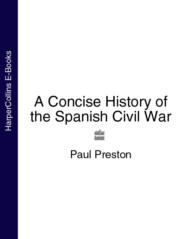По всем вопросам обращайтесь на: info@litportal.ru
(©) 2003-2024.
✖
Juan Carlos: Steering Spain from Dictatorship to Democracy
Настройки чтения
Размер шрифта
Высота строк
Поля
CHAPTER THREE The Tribulations of a Young Soldier1955–1960 (#ulink_b4b718d7-85dd-5d00-8dcb-07c4dac30645)
Despite Franco’s readiness to excuse Juan Carlos the entry examinations for the Zaragoza military academy, General Martínez Campos insisted that he undergo the test just like any other prospective cadet. Having passed, Juan Carlos joined the academy in December 1955. As his companions from the academy would later recall, the exams were very difficult and they believed that, although the Prince was usually treated like any other candidate by the examiners, the mathematics test he sat must have been easier than the one they took: indeed, Juan Carlos would soon be shown to be well below average in this subject.
(#litres_trial_promo)
Although Juan Carlos, in his public declarations at least, would later recall his years as a cadet with nostalgic fondness, his time at the military academies did not always go smoothly. When he took his oath of loyalty to the colours on 15 December 1955, the ceremony was chaired by the brusque General Agustín Muñoz Grandes, the Minister for the Army, who was much more inclined to the Falangist than to the monarchist cause. Accordingly, in his speech, he made no mention of the Prince.
(#litres_trial_promo) In addition, Juan Carlos was saddened on this occasion by the fact that Franco had not permitted his father to attend the ceremony.
(#litres_trial_promo) On 10 December, Don Juan wrote to him, reminding him of the tremendous responsibilities he would be undertaking when he swore his loyalty to Spain: ‘15 December will be a great day because it is the day on which you will knowingly consecrate the rest of your life to the service of Spain.’ Juan Carlos sent his father a telegram: ‘Before the flag I have promised Spain to be a perfect soldier and with tremendous feeling I swear to you that I will fulfil that oath.’
(#litres_trial_promo)
It was Juan Carlos’s fervent wish to be allowed to get on with life as an ordinary cadet. ‘You can avoid a lot of problems by getting lost in the crowd.’ That was rendered impossible because the campaign against Don Juan in the Movimiento press remained intense during this period. Juan Carlos found these constant attacks on his father upsetting. Some of his fellow cadets would derive a malicious pleasure from quoting the insinuations of the press. On several occasions, Juan Carlos was sufficiently provoked by remarks that his father was a freemason or a bad patriot (for serving in the Royal Navy) to get involved in fights. These were organized furtively in the stables at night, possibly even with the complicity of the teaching staff. When Juan Carlos eventually complained to Franco about the media’s attacks on his father, the Caudillo replied, with his habitual cynicism, that the Spanish press was independent and that he had no influence over it. He stated that, ‘it was impossible to do anything, since the press was free to express its opinions.’ As Juan Carlos commented, ‘it was such an outrageous lie that all I could do was laugh.’
Recounting this later, Juan Carlos was rather benevolent with regard to Franco. Reflecting on the fact that the Caudillo saw in Don Juan a dangerous liberal, he commented, ‘When my father said “I want to be King of all Spaniards,” Franco must have translated this as “I want to be King of the victors and of the vanquished.”’ This puzzled Juan Carlos, because of the fact that Franco knew full well that Don Juan had tried to join the Nationalist forces against the ‘reds’. Referring to the cunning letter with which Franco had refused Don Juan’s offer, Juan Carlos commented rather uncritically, ‘On that occasion, the General wrote my father a very beautiful letter to thank him for his gesture. In it, he told him that his life was too precious for the future of Spain and that he forbade him to risk it at the battle front. Why was my father’s life precious if not because he was the heir to the crown? But, what can you say … that was the General for you. At times, putting up with him was very difficult. But, as you know, I had totally convinced myself that to achieve my objectives I had to put up with a lot. The objective was worth the trouble.’ The objective was the re-establishment of the Borbón family on the throne.
(#litres_trial_promo)
Despite these occasional outbursts of hostility towards his father, Juan Carlos would later recall his years in the military academies as amongst the happiest in his life. In a brief letter to the readers of a Spanish magazine which published, in 1981, a feature on this period, he wrote: ‘I remember my years at the military academies with genuine satisfaction and nostalgia … Now that my post and occupations leave me hardly any time or freedom, I often think back to that distant period in which my life evolved in a way so different from the current one.’
Above and beyond the special status, of which none of his fellow students could remain ignorant, Juan Carlos soon became a genuinely popular cadet. His contemporaries at the academies would later describe him as a ‘sensational companion’, outgoing, generous, particularly gifted at sports and endowed with an extraordinary memory. His ability to remember people’s names and faces would later enable him to recognize and greet comrades and teachers whom he had not seen in years. He had a good sense of humour and enjoyed playing practical jokes on his friends. He often participated, for instance, in the food fights that occasionally erupted at lunch times in the refectory. Academically, he was said to be of ‘average intelligence’, but above average in ‘general knowledge’, foreign languages, tactical thinking and military ethics. He struggled with mathematics, which was ‘the subject dreaded by all’. Juan Carlos was also perceived as being deeply religious: every day, he would get up before reveille in order to attend the voluntary, early morning mass.
When it came to friendships, the Prince necessarily had to be careful, making every effort to avoid the creation of a circle of admirers or sycophants who wanted to be with him only out of self-interest. He tried to get to know as many people as possible, which was made easier by the fact that the class groups changed every term. He was aware of the dangers of nepotism: indeed, at the end of his military training, he refused to use his influence in order to get plumb postings for his friends from the academies. He did, however, strive to keep in touch with his old companions, attending and often even organizing reunions.
(#litres_trial_promo) Not all of his contemporaries were keen to flatter him: ‘Some thought that I was a spoilt brat, spoiled by destiny, a daddy’s boy, the inhabitant of another planet. I had to use my fists to become one of them.’
(#litres_trial_promo) To this end, he encouraged his peers to treat him with considerable informality. His close friends called him ‘Juan’ or ‘Juanito’, or even ‘Carlos’, whilst his other companions addressed him with the informal ‘tú’ and jokingly called him SAR, an abbreviation of ‘Su Alteza Reaf’ (His Royal Highness).
(#litres_trial_promo)
This easy-going informality outraged General Martínez Campos who visited the academy each weekend to review the Prince’s progress and have lunch with him. On one occasion, Martínez Campos allowed his tutee to invite a couple of his academy friends to join them for lunch. During the meal, when he heard one of these friends call the Prince ‘Juan’, he exploded. Red-faced with fury, he leapt to his feet, knocking his chair out of the way and shouted at the culprit: ‘Gentleman cadet! On your feet and stand to attention! How dare you, gentleman cadet, address informally and by his first name someone that I, a Lieutenant-General, address as His Royal Highness!’ Unsurprisingly, Juan Carlos was never again able to convince his friends to join him for lunch with Martínez Campos.
(#litres_trial_promo) Juan Carlos soon came to dread these visits from his supervisor, turning pale and trembling as the meeting time came closer.
(#litres_trial_promo)
The teaching staff at the academy addressed Juan Carlos as ‘Your Highness’ and, at roll-call, he was referred to by his full title – ‘His Royal Highness Juan Carlos de Borbón’. That aside, in so far as it could be put aside, Juan Carlos was, according to his contemporaries, treated by the teaching staff just like any other student. He was disciplined like any other cadet when he broke the rules. Once, for instance, he was put under house arrest for being caught smoking indoors. The Prince was subject to the same timetable as the other students, which left them very little free time. Reveille was at 6.15 a.m., although Juan Carlos rose earlier in order to attend mass. By 6.30 a.m., all cadets had to be standing to attention in the corridors, where roll-call took place. The young men were then allowed to take their showers – in water usually either freezing or so hot as to be almost unbearable. Individual study time followed, then lessons, lunch, a half-hour break, further lessons, another half-hour break and dinner. According to his contemporaries, no one was ever asked by the teaching staff to make allowances for the Prince or to treat him with special deference. In his first year at Zaragoza, Juan Carlos was thus subjected to the same ‘novatadas’ (initiation tests) and other pranks as the other newly arrived students. Years later, he remembered not only many of the pranks played on him on his arrival at Zaragoza, but also their names: ‘I had to undergo everything. I had to do the “reptile” on the bedroom floor. I slept with the “nun” [with a sabre resting on his chest]. They “X-rayed” me [they made him sleep between two planks from the bedside table]. I also had to let them “clay pigeon shoot” me [he was left in a room blindfolded and, when he attempted to leave, he was battered with pillows].’
(#litres_trial_promo)
Juan Carlos enjoyed being an ordinary cadet and even made an effort to prevent the teaching staff giving him preferential treatment. He once complained, for instance, that the mathematics tutor gave him an undeserved grade. According to his fellow students, the Prince had a ‘natural sense of justice’. Prudently, he used his special status only in order to help others. For instance, when a companion had been punished for some misdemeanour by being deprived of pudding, Juan Carlos would complain that there was something wrong with his helping in order to get an extra one to pass to the friend.
(#litres_trial_promo)
Nevertheless, it was inevitable that there would be differences in the way that Juan Carlos was treated at the Zaragoza military academy. He travelled into the centre of Zaragoza by car, a black SEAT 1500, whereas his contemporaries did so by tram. Although, while out on manoeuvres, he slept on the floor of a tent like everyone else, in the academy, he had an independent, though small, bedroom, while the others slept in communal dormitories. According to one of his Zaragoza companions, Juan Carlos’s bedroom, which was situated above the infirmary, was Spartan. The only objects in it, besides a bed and a desk, were a multiple photograph frame displaying the pictures of all of the Borbón kings of Spain – including his father. He had pictures of his mother, his brother and his two sisters and a girlfriend, María Gabriella di Savoia. His book collection was small – a few textbooks and next to his bed usually was a novel by Marcial Lafuente Estefanía, from the ‘Rodeo’ collection of western stories popular at the time. Juan Carlos enjoyed less freedom than the others. He was obliged to have extra lessons and saw his private tutors during the morning period that should have been for individual study, during the afternoon breaks and sometimes at weekends. On the occasions when it was possible to go out for drinks in Zaragoza with his friends, they were delighted to be able to use his status and his unusual blond good looks as a ploy to get to know girls. When the cadets were on trains en route to camp, at each station women would come out to say hello to him. His ability to pick up girls was as unlimited as a capacity for falling briefly in love.
(#litres_trial_promo)
In March 1956, there occurred an incident which totally diverted Juan Carlos from any thoughts of girls or even of the crown. He and his 14-year-old brother had travelled from Spain on the Lusitania Express to spend the Easter holidays in Estoril with their parents and sisters. It was the first time for some months that Don Juan and Doña María de las Mercedes had had all four of their children together. Alfonsito was a pupil at the lycée in Madrid and was about to become a cadet at the Spanish naval college at Marín near Pontevedra. Alfonsito was regarded as the family favourite, witty, intelligent and more simpático than his rather introspective elder brother. His passion for golf and sailing had brought him particularly close to Don Juan.
(#litres_trial_promo)
On 29 March, Maundy Thursday, the entire family, dressed in black, attended morning mass and took communion at the small church of San Antonio de Estoril near the sea front. The principal Maundy Thursday service, which they also intended to attend, would not take place until the evening. In those days, Catholics still had to prepare for communion by fasting from midnight of the previous day. Rather than fast for 24 hours, the family had taken communion at the early mass. After a frugal lunch, Don Juan and Juan Carlos accompanied Alfonsito to the Estoril golf club where he was taking part in a competition (the Taça Visconde Pereira de Machado). Despite the cold blustery weather, Alfonsito won the semi-final and was looking forward to playing in the final on Easter Saturday. With no sign of a let-up in the cold wind and showers, the Spanish royal family went home. At 6 p.m. they attended the evening mass in the church of San Antonio and then returned home. At 8.30 p.m., the car of the family doctor, Joaquín Abreu Loureiro, screeched to a halt outside the Villa Giralda. Apparently, Juan Carlos and Alfonsito had been in the games room on the first floor of the house, engaged in target practice with a small calibre. 22 revolver, while waiting for dinner. A recent gift, the pistol was, at any reasonable distance, relatively innocuous. Nevertheless, there had been an accident in which Alfonso was shot and died almost immediately.
On Friday 30 March, the Portuguese press carried a laconic official communiqué about Alfonso’s death issued by the Spanish Embassy in Lisbon. ‘Whilst his Highness the Infante Alfonso was cleaning a revolver last evening with his brother, a shot was fired hitting his forehead and killing him in a few minutes. The accident took place at 20.30 hours, after the Infante’s return from the Maundy Thursday religious service, during which he had received holy communion.’ The decision to make this anodyne statement and to impose a blanket of silence over the details was taken personally by Franco.
(#litres_trial_promo)
Inevitably, however, there were rumours that the gun had been in Juan Carlos’s hands at the time of the fatal shot. Within three weeks, these rumours were being stated as undisputed fact in the Italian press.
(#litres_trial_promo) They were not denied by Don Juan at the time nor have they ever been denied by Juan Carlos since. Shortly after tire accident, Gonzalo Fernández de la Mora, a monarchist and member of Opus Dei on Don Juan’s Privy Council who later served Franco as Minister of Public Works, met Pedro Sainz Rodríguez and commented later: ‘His short and portly figure was woebegone because a pistol had gone off in Prince Juan Carlos’s hand and killed his brother Alfonso.’ It is now widely accepted that Juan Carlos’s finger was on the trigger when the fatal shot was fired.
(#litres_trial_promo)
In her autobiography, Doña María de las Mercedes neither denied nor confirmed that it was Juan Carlos who was holding the gun when it went off. On the other hand, she directly contradicted the official statement. Doña María explained that, on the previous day, the boys had been fooling around with the gun, shooting at streetlamps. Because of this, Don Juan had forbidden them to play with the weapon. While waiting for the evening service, the two boys became bored and went upstairs to play with the gun again. They were getting ready to shoot at a target when the gun went off shortly after 8 p.m.
(#litres_trial_promo) One possibility, later suggested by Doña María to her dressmaker, Josefina Carolo, is that Juan Carlos playfully pointed it at Alfonsito and, unaware that the gun was loaded, pulled the trigger. In similar terms, Juan Carlos apparently told a Portuguese friend, Bernardo Arnoso, that he pulled the trigger not knowing that the gun was loaded, and that it went off and the bullet ricocheted off a wall and hit Alfonsito in the face. The most plausible suggestion, possibly made by the boys’ sister Pilar to the Greek author Helena Matheopoulos, is that Alfonsito left the room to get a snack for himself and Juan Carlos. Returning with his hands full, he pushed the door open with his shoulder. The door knocked into his brother’s arm. Juan Carlos involuntarily pulled the trigger just as Alfonsito’s head appeared around the door.
(#litres_trial_promo)
Doña María de las Mercedes later recalled: ‘I was reading in my drawing room, and Don Juan was in his study, next door. Suddenly, I heard Juanito coming down the stairs telling the girl who worked for us: “No, I must tell them myself”. My heart stood still.’
(#litres_trial_promo) Both parents ran upstairs to the games room where they found their son lying in a pool of blood. Don Juan tried to revive him but the boy died in his arms. He placed a Spanish flag over him and, according to Antonio Eraso, a friend of Alfonsito, turned to Juan Carlos and said, ‘Swear to me that you didn’t do it on purpose.’
(#litres_trial_promo)
Don Alfonso was buried in the cemetery at Cascais at midday on Saturday 31 March 1956. The funeral service was conducted by the Papal Nuncio to Portugal, and was attended by prominent Spanish monarchists and royal figures from several European countries. The desolate Don Juan could barely contain his distress, his eyes full of uncomprehending sorrow. Yet he greeted them all with grace and dignity. The Portuguese government was represented by the President of the Republic. In contrast, the Caudillo was represented merely by the Minister Plenipotentiary of the Spanish Embassy, Ignacio de Muguiro. The Ambassador, Franco’s brother Nicolás, was in bed, recovering from a car accident.
(#litres_trial_promo) There were messages of sympathy from all over the world, including one each from General Franco and Doña Carmen Polo.
Juan Carlos attended in the uniform of a Zaragoza officer cadet. His look of vacant desolation masked his inner agony of guilt. After the ceremony, Don Juan took the pistol that had killed Alfonsito and threw it into the sea. There was considerable speculation about the gun’s origins. It has been variously claimed that the weapon had been a present to Alfonsito from Franco or from the Conde de los Andes, or that someone in the Zaragoza military academy had given it to Juan Carlos. The autobiography of Juan Carlos’s mother states discreetly that: The two brothers had brought from Madrid the small six-millimetre pistol and it has never been revealed who gave it to them.’
(#litres_trial_promo)
Unable to support the presence of his elder son, Don Juan ordered Juan Carlos to return immediately to the Zaragoza academy. General Martínez Campos and Major Emilio García Conde arrived in a Spanish military aircraft in which the Prince was taken back to Zaragoza. The incident affected the Prince dramatically. The rather extrovert figure, so popular with his comrades in the academy for his participation in high jinks and chasing the local girls, now seemed afflicted by a tendency to introspection. Relations with his father were never the same again. Although he would return, superficially at least, to being a fun-loving young man, he was profoundly changed by the event. More alone than ever, he became morose and guarded in his speech and actions.
(#litres_trial_promo)
The death of her younger son profoundly affected Doña María de las Mercedes who fell into a deep depression, began to drink, and turned ever more for company to her friend Amalín López-Dóriga. Doña María was held partly responsible for the accident by her husband because she had given in to her sons’ repeated requests and allowed them to play with the gun despite their father’s prohibition. According to one such report, by the French journalist Françoise Laot on the basis of interviews with Doña María, she personally unlocked the secreter (writing bureau) where the gun was kept and handed it to Juan Carlos. Françoise Laot would later state that, 30 years after the accident, María de las Mercedes told her, ‘I have never been truly wretched except when my son died.’
(#litres_trial_promo) So affected was Doña María that she had to spend some time at a clinic near Frankfurt.
His personal devastation aside, the death of Alfonso significantly weakened the political position of Don Juan. Henceforth, he would be more dependent on the vagaries of the situation of Juan Carlos in Spain. In the words of Rafael Borràs, the distinguished publisher and author of a major biography of Don Juan, the death of Alfonso: ‘deprived the Conde de Barcelona, from the point of view of dynastic legitimacy, of a possible substitute in the event of the Príncipe de Asturias agreeing, against his father’s will, and outside the normal line of succession, to be General Franco’s successor within the terms of the Ley de Sucesión’. Borràs speculates that, had Alfonso lived, his very existence might have conditioned the subsequent behaviour of Juan Carlos in the struggle between his father and Franco.
(#litres_trial_promo)
The Prince’s uncle, Don Jaime, endeavoured to derive political advantage from the tragedy. His first reaction had been to send a message of sympathy. However, on 17 April 1956 when the Italian newspaper II Settimo Giorno published an account of the accident which pointed the finger at Juan Carlos, he told his secretary Ramón de Alderete: ‘I am distraught to see the tragedy of Estoril dealt with in this way by a journalist who has been used in good faith, because I refuse to doubt the veracity of my unfortunate nephew’s version, as published by my brother. In this situation, and in my position as head of the Borbón family, I can only deeply disagree with the stance of my brother Juan who, in order to prevent future speculation, has neither demanded the opening of an official enquiry into the accident nor called for an autopsy on the body of my nephew, as is normal in such cases.’ These words were reproduced in the French press, presumably via Alderete and with the permission of Don Jaime.






